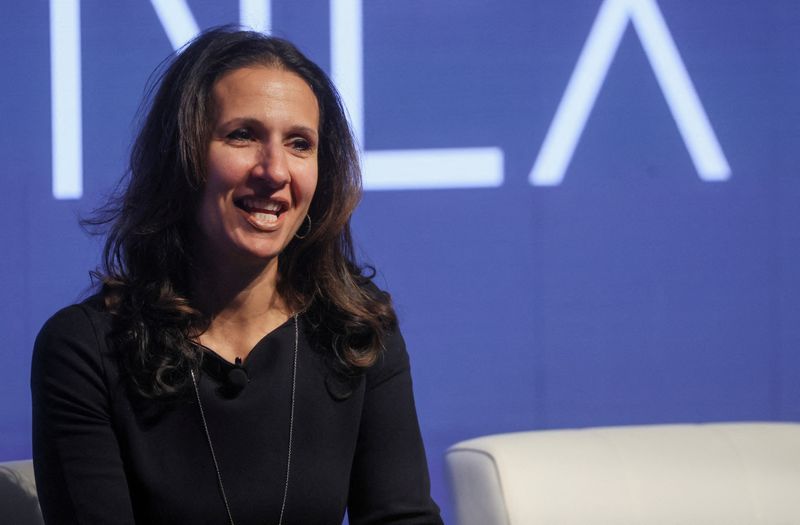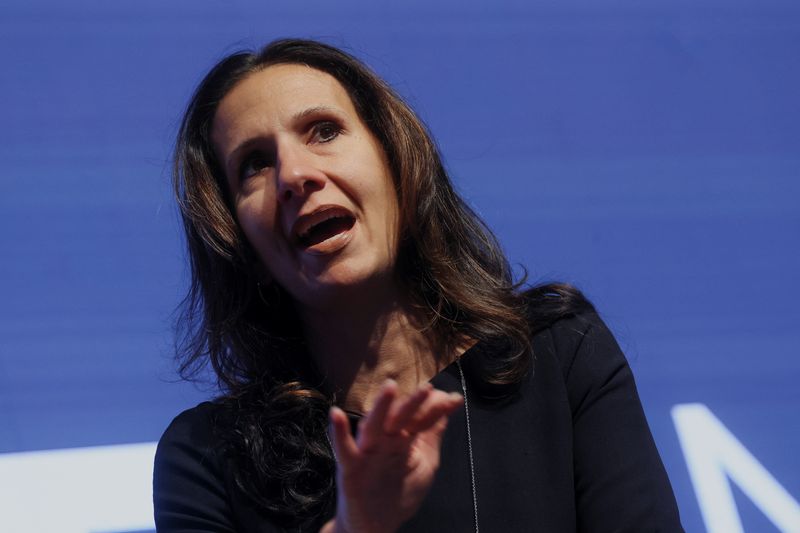By John McCrank, Saeed Azhar and Lananh Nguyen
NEW YORK (Reuters) -Volatility and market uncertainty have taken a big hit on the number of companies going public, driving down initial public offering proceeds by 93% this year, Lynn Martin, president of the New York Stock Exchange said on Wednesday.
"There is a lot of uncertainty and there's a lot of different forces that are impacting markets," said Martin during an interview at the Reuters NEXT conference.
The NYSE, which is owned by the Intercontinental Exchange (NYSE:ICE) Inc, is the world's biggest exchange, with more than 2,400 listed companies, as well as being home to over 3,000 exchange traded funds (ETFs).
Last year was a record for IPOs at the NYSE, fueled in large part by the boom in special purpose acquisition companies (SPACs), but that activity has slowed to a trickle as high inflation and rising interest rates have soured market sentiment and SPACs have drawn regulatory scrutiny.
PIPELINE
"Our pipeline is tremendous -- the reason companies aren't coming to market is because all the volatility in the market," said Martin, who worked for IBM (NYSE:IBM) as a computer coder before joining the NYSE in 2001.
"They don't know what they are entering into, either on their IPO day, or, importantly, the weeks and months that follow," she said.
Martin said companies "very much want to go public," but they are just all waiting for the volatility in the market to calm down.
Unlike the volatile IPO market, the Exchange Trade Funds' issuance may witness another record this year, she said
"We've already done about 250 ETFs this year that have come to market, and we have a tremendous pipeline for December," Martin said.
NYSE parent ICE earlier in November reported third-quarter profit that topped estimates. Even as the global market rout forcing companies to delay their stock market listings, it led to a surge in trading volumes across asset classes as investors rejig portfolios to hedge against risk.
Martin on Wednesday also spoke about the collapse of crypto exchange FTX, pointing out FTX lacked a central counterparty for clearing its trades, which is why their bankruptcy is "a bit murky."
"The FTX situation may have added a layer of complexity to to the crypto markets in general," Martin said.
Cryptocurrencies have been under pressure this year after a string of high profile bankruptcies at crypto lenders and exchanges.
The biggest case was FTX, which collapsed after traders pulled $6 billion from the platform in three days and rival exchange Binance abandoned a rescue deal.
The implosion has left an estimated 1 million creditors facing losses totaling billions of dollars.
Martin said she was encouraged by talks between the U.S. and Chinese regulators to find "a path forward" to resolve the row over the U.S. inspection of audits of U.S.-listed Chinese companies.
Washington and Beijing reached an agreement in August allowing U.S. auditors to inspect China-based accountants, the first step in a process that could prevent around 200 Chinese companies being kicked off American stock exchanges.
Martin said the exchange has continued to talk to Chinese companies hoping to list in New York, but added "a good chunk" of those companies could not qualify for a NYSE listing.

"Those who qualify continue to engage with us," she said.
To view the Reuters NEXT conference live on Nov. 30 and Dec. 1, please click [https://www.reuters.com/world/reuters-next/]
